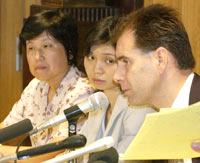"I hope the Japanese government does not do such a shabby thing"
By Dr. René Gralla, Hamburg/Germany
Tokyo/Hamburg – Maybe the place of his greatest triumph will be his
last resort. In Reykjavik in 1972 Robert James Fischer, called "Bobby",
won the World Championship Match of the century against the Soviet Russian
Boris Spassky. Now the 61-year-old US citizen Fischer, who has been held in
a Japanese detention facility for six monthes, has sent
a letter to Mr. Halldor Blöndal, President of the Icelandic Parliament
("Althingi"), formally requesting citizenship of the Nordic nation.
The latest news is that Iceland may award Fischer citizenship. Here are three
of the hundreds that you can find in the international press:

Miyako Watai, Masako Suzuki, and
Fischer's legal advisor John Bosnitch |
On July 13th, 2004, Mr. Fischer was arrested at Narita Airport, Tokyo, for
allegedly attempting to leave the country on an invalidated passport. The USA
had cancelled the validity of Mr. Fischer's passport before; Washington wants
the former American chess hero to be extradited. Fischer is facing up to ten
years in prison in the USA, since he has played a rematch 20 years after Reykjavik
in the former Yugoslavia against Mr. Spassky in 1992, thus defying a UN embargo.
After the Japanese authorities rejected the most recent petition by Mr. Fischer's
lawyers that he might be released from prison at the detention centre Ushiku
outside Tokyo, and that he might be allowed to travel to Iceland where he has
already been granted refuge, Dr. René Gralla has discussed the newest
twist of the case with Mrs. Masako Suzuki, 31, spokeswoman of the team of Mr.
Fischer's lawyers.
Interview with Mrs. Masako Suzuki
Gralla: There has been the chance of an elegant solution
of the case of Mr. Fischer quite recently. Iceland has already granted a permit
of residency to Mr. Fischer, and officials of the government at Reykjavik have
stated that they would allow Mr. Fischer to enter the country even without
a valid passport. Conforming to that a petition has been filed that Mr. Fischer
might be released from prison at the Ushiku Detention Centre near Tokyo and
that he might be allowed to travel to Iceland. But at a most recent hearing
at a Tokyo court the lawyers of the Japanese Ministry of Justice have flatly
rejected that plea by declaring that the Ministry was "not prepared to
change Mr. Fischer's deportation destination to Iceland, and that he would
have to remain in detention". Do I understand that statement correctly:
Japan would allow Mr. Fischer to leave the country in case of deportation,
and the destination of that deportation can only be the United States?
Suzuki: First, I want to make it clear that the denial by
the Japanese Ministry of Justice of Mr. Fischer's departure to Iceland is clearly
against the international law, the Constitution, the interpretation of the
Japanese Immigration Act by the Immigration Authority itself, and by its practice.
It is indisputable that anyone has the freedom to leave a country under the
customary international law. It is also generally understood that the Japanese
Constitution guarantees the freedom to leave a country. On top of that, according
to the commentary written by the Director of the Tokyo Immigration Bureau,
"the only purpose of deportation is to deport foreigners who have been
finally denied residence in Japan", and that the decision of the destination
is "an important matter for foreigners to be deported", not for Japan.
As a natural consequence of this, in the past when a foreigner who has been
issued a deportation order to his home country, but has claimed not to be able
to go back to that country, and that he will be accepted by a third country,
the Ministry of Justice has granted the departure from Japan to the third country
without any problem. In such cases, the change of destination has never been
raised as an issue to be argued or solved.
Gralla: Mr. Fischer has recently sent a letter to the President
of the Icelandic Parliament requesting citizenship of the Nordic country. Since
a special act of legislation is required for granting Icelandic citizenship
to Mr. Fischer, are you optimistic that the Althingi will pass that special
law in favour of Mr. Fischer?
Suzuki: Whether I am optimistic about the Icelandic citizenship
matter? I really don't know the result because I am a lay person regarding
the Icelandic law and political situation.
Gralla: Has the application for Icelandic citizenship to
be considered as a last desperate attempt of Mr. Fischer to avoid deportation
to the United States?

Fischer's legal team
with Masako Suzuki
in the lead. AP
Photo |
Suzuki: The expression "last attempt" is not right.
I understand that this action was taken to make the Japanese Ministry of Justice
lose one false explanation about their refusal of his departure from Japan
to Iceland and to pressure them more. I've heard that they are saying that
there is a problem on his deportation to Iceland because his home country is
the United States. That is a clear false statement. Holding Icelandic citizenship
is not necessary at all for Mr. Fischer to go to Iceland. However, if he obtains
Icelandic citizenship, it will make it very difficult for the Ministry of Justice
to refuse his departure to Iceland because Iceland is his home country then.
Gralla: Even if the Althingi will pass that required law
granting citizenship to Mr. Fischer, what will be the reaction by Japan? Will
they finally let him go?
Suzuki: They might try to find another excuse to refuse Mr.
Fischer's departure. I sincerely hope, though, as a Japanese citizen that the
Japanese government does not do such a shabby thing.
Gralla: There have been reports by news agencies that the
Japanese Justice Minister, Mrs. Chieko Nohno, murmured "yes, yes"
after being asked publicly, some weeks ago, if Japan would allow Mr. Fischer
to leave for Iceland in the case that Iceland would grant the right to immigrate
and the right of residency in Iceland to Mr Fischer. The authorities at Reykjavik
have done this, but now Tokyo is balking again. What has made Mrs. Cheiko Nohno
change her mind? Has the Tokyo government been buckling under US pressure?
Suzuki: It is a very obvious that the US has been pressuring
Japan from the first beginning of this case. I don't think that Mrs. Nohno
has changed her mind. According to the official release, she said at the press
conference that she agreed to consider the change of destination. However,
I believe she did not intend to do anything at all, and actually she has not
done anything so far.
Gralla: A high-ranking official at the Japanese Ministry
of Justice is reported to have stated: "We can keep [Mr. Fischer] as long
as we like. We can eat him if we choose to." What is the meaning of that,
especially of the last phrase?
Suzuki: Regarding the former expression, I don't clearly
remember that he made such an explicit statement but certainly the Ministry
of Justice applies the interpretation that it can indefinitely detain a foreigner
who has been issued a deportation order until it executes the deportation order.
With regard to the second sentence that has been reported: I'm afraid there
was a kind of miscommunication; the lawyer of the Ministry of Justice did not
make such a statement. It is said, however, that a high-ranking official of
the Ministry of Justice has said several decades ago that they were at liberty
to eat foreigners by boiling or baking; the expression to be "at liberty
to eat someone by boiling or baking" is a figure of speech used in Japan.
Gralla: There have been plans of Mr. Fischer and Mrs. Miyoko
Watai to marry. Mrs. Watai is the President of the Japanese Chess Federation.
Would Mr. Fischer, after the eventual marriage between Mrs. Watai and Mr. Fischer,
be safe with regard to extradition pleas by the US? Due to the fact that he
would be married to a Japanese woman? How far have those marriage plans proceeded?
Suzuki: Extradition procedure has not been undertaken, and
it is impossible to use extradition regarding Mr. Fischer's case because the
crime which is said he has committed is not a crime in Japan. A sincere marriage
with a Japanese citizen – like in the case of Mrs. Watai and Mr. Fischer
– is a positive factor for deciding whether a foreigner should be granted
a status to stay in Japan. The final recognition by the Ministry of Justice
has not been made though the marriage registration has been submitted several
months ago.
Gralla: Would it be helpful for the legal representation
of Mr. Fischer if he would apologize publicly for his verbal attacks against
the USA in the aftermath of September 11th, 2001? And if he would apologize
for his anti-semitic insults that he has expressed on the occasion of several
radio interviews? Can you – being the lawyer of Mr. Fischer – persuade
him to do so?
Suzuki: If doing such a thing would help him, it would become
very clear that his passport had been "revoked" and that he has been
detained only because of political considerations – which means that
those actions taken by the US and the Japanese government would have to considered
illegal.
Gralla: There are reports that Mr. Fischer is getting sick
as a result of six monthes in prison already ...
Suzuki: His health is suffering because of the detention.
He gets dizzy often.
Gralla: You are the lawyer of a former legend of chess. Do
you play chess yourself, or Shogi, the Japanese version of the game?
Suzuki: I don't play chess or Shogi at all.
Previous ChessBase articles
|
 Bobby Fischer applies for Icelandic Citizenship Bobby Fischer applies for Icelandic Citizenship
25.01.2005 After
the Japanese authorities last week refused Fischer's request to be
extradited to Iceland the chess legend, who is being held in a Japanese
detention facility, has today written to the President of the Icelandic
Althingi (picture), applying for Icelandic citizenship. A special law
would have to be passed to grant Fischer's request.
|
|
 Bobby Fischer – immigration plans on ice Bobby Fischer – immigration plans on ice
22.01.2005 His
supporters filed a petition that Fischer might be released from
detention in a Tokyo jail and allowed to travel to Iceland, where he
has been granted refuge. But Japanese Justice Ministry lawyers said
they were not prepared to change Fischer's deportation destination to
Iceland, and that he would have to remain in detention. A harsh blow for the chess legend.
|
|
 Bobby Fischer – six months in jail Bobby Fischer – six months in jail
1/17/2005 On
July 13, 2004 he was arrested at Narita Airport in Tokyo, for
attempting to leave the country on an invalidated. Since then the
greatest hero of Western chess has been languishing in a Japanese
detention facility, now physically exhausted and suffering from dizzy
spells. His Icelandic friends, who are offering him refuge, have
launched another appeal to the authorities.
|
|  US
threatens Iceland, Fischer Committee appeals US
threatens Iceland, Fischer Committee appeals
22.12.2004
Iceland
is under US pressure to drop plans to offer a home to fugitive former
chess champion Bobby Fischer, the Reuters news agency tells us. But the
Icelandic government has stated that its offer "will not be withdrawn
despite pressure from the United States." How do we know that? Among
other things we read it in Aljazeera, would you believe? Here's the latest
on this international
confrontation.
|
 RJF
Committee mobilizes pro-Fischer forces RJF
Committee mobilizes pro-Fischer forces
18.12.2004
While Bobby Fischer remains incarcerated in a Japanese prison a special
committee in Iceland is moving to get him free and find him a home on
the North-Atlantic island country. Iceland's foreign minister and a prominent
political scientist have spoken out. Here's a report on Fischer's Iceland
Connection...
|
 Fischer
to get refuge in Iceland? Fischer
to get refuge in Iceland?
12/16/2004
The news today on Bobby Fischer, who is currently being held in a Japanese
detention facilities pending extradition to the US, is that the Icelandic
government has offered to grant him a residence permit. In a telephone
interview Fischer speaks about his plight in Japan and reacts to statements
by Garry Kasparov on Fischer Random Chess. Full
details... |
 Returning
to the 'scene of the crime' Returning
to the 'scene of the crime'
30.11.2004
Twelve years ago Boris Spassky played a match against Bobby Fischer in
Yugoslavia. That got Fischer into a lot of trouble, while for Spassky,
a French citizen, there were no repercussions. Now the tenth world champion
returned to Belgrade to open the Belgrade Chess Trophy. Quick
interview... |
 Fischer
to Bush and Koizumi: 'You are going to pay for this!' Fischer
to Bush and Koizumi: 'You are going to pay for this!'
18.10.2004
Bobby Fischer, still in detention in Japan, has spoken out again in an
interview, this time threatening the Japanese Prime Minister Koizumi
and US President Bush: "You are going to pay for this, and you are going
to pay for your crimes in Iraq too." His new lawyer, Richard J. Vattuone,
plans to release documents to prove US government involvement in a
plot against Fischer. |
 'We
want to live together forever' 'We
want to live together forever'
01.09.2004
She collected pictures of her chess hero after his match with Boris Spassky
in 1972. One year later they met in Tokyo – the start of a romance spanning
decades. Since four years the two have lived together in downtown Kamata
in Tokyo's Ota Ward. In an exclusive interview for ChessBase Miyoko Watai
tells us the story of her life
with Bobby Fischer. |
 Listen
to Bobby Fischer Listen
to Bobby Fischer
26.08.2004
In emotional phone calls from his detention cell in Tokyo ex world champion
Bobby Fischer gave a Philippine radio station two lengthy interviews. Fischer
is facing deportation and incarceration in the US, and voices his nightmare
fears: "I will be tried, convicted, sentenced, imprisoned, tortured and
murdered." We have summary transcripts
and audio files. |
 Dramatic
moments around Fischer's deportation Dramatic
moments around Fischer's deportation
25.08.2004
First the Japanese Justice Minister Daizo Nozawa issued a deportation order
against former world champion Bobby Fischer's, then Fischer's lawyers filed
a lightning appeal on the grounds that physical deportation would be a
flagrant violation of Fischer's right to full legal recourse and protection
under Japanese law. Here's the full
story by Fischer's legal coordinator. |
 'Bobby
Fischer and I have decided to marry' 'Bobby
Fischer and I have decided to marry'
17.08.2004
Bobby Fischer, the former world chess champion, plans to marry the president
of the Japan Chess Association (and four-time Japanese women's champion)
Miyoko Watai. This was reported in newspapers and wire services last night.
Now Watai-san has sent us a statement explaining the background of her
personal relationship with Fischer. |
 Fischer
renounces US citizenship Fischer
renounces US citizenship
15.08.2004
Bobby Fischer has been moved to a new detention facility in Tokyo, pending
a decision on his deportation to the US, where he faces a 10-year jail
sentence. A lot of new material has surfaced, including Fischer's handwritten
renouncement of his US citizenship and a blow-by-blow description and picture
of his arrest at Narita Airport. Harrowing
stuff... |
 Spassky
to Bush: Arrest me! Spassky
to Bush: Arrest me!
10.08.2004
Boris Spassky, who played the contentious return match against Bobby Fischer
in Yugoslavia 1992, for which the latter is currently facing deportation
and incarceration in the US, has appealed to President Bush to show mercy
and charity for his tormented successor. If for some reason that should
be impossible, Spassky suggests a very
imaginative alternative... |
 Fischer's
appeal rejected Fischer's
appeal rejected
28.07.2004
Bobby Fischer's appeal against his deportation was rejected today by Japanese
authorities. Meanwhile the Icelandic Chess Federation has appealed to US
president Bush to pardon Fischer and set up a petition web site to collect
signatures. In Tokyo a "Free Fischer Press Conference" is scheduled for
Thursday. More... |
 Fischer
a sacrificial pawn? Fischer
a sacrificial pawn?
25.07.2004
Bobby Fischer is still in detention at Narita Airport in Tokyo, traumatised
but stubborn, "behaving like a Samurai". At the same time news outlets
all over the world are covering the story, with Fischer's brother-in-law
Russell Targ assailing the Bush administration for playing election year
politics with the former chess champion's freedom. There's
a lot to be read... |
 Game
of Life: Kasparov on Fischer - in full Game
of Life: Kasparov on Fischer - in full
20.07.2004
The news of Fischer's arrest in Japan came as a shock to Garry Kasparov,
who was in a holiday camp working intensely on the games of his greatest
American predecessor. In today's issue of The Wall Street Journal Kasparov
assesses Fischer's chess career – for a public that was being exposed to
his current situation. We now bring you Kasparov's
full article. |
 Will
Fischer be extradited? Will
Fischer be extradited?
19.07.2004
Chess legend Bobby Fischer, the hero of millions, languishes in the detention
facilities of Narita Airport in Tokyo, waiting for a decision by Japanese
Immigration authorities on his deportation to the US. We have collected
all the documents and reconstructed a timeline to his arrest. Fischer,
who has no legal counsel, is appealing
for international assistance. |
 Bobby
Fischer detained in Japan (updated) Bobby
Fischer detained in Japan (updated)
16.07.2004
It's the latest twist in the sad tale of American former world champion
Bobby Fischer. He has been detained in Japan and faces possible deportation
to the US to face charges for playing in Yugoslavia in 1992. Fischer's
website says he was "very nearly killed" in Japan. The story has been picked
up by news services all over the
world. |




















 Bobby Fischer applies for Icelandic Citizenship
Bobby Fischer applies for Icelandic Citizenship Bobby Fischer – immigration plans on ice
Bobby Fischer – immigration plans on ice Bobby Fischer – six months in jail
Bobby Fischer – six months in jail US
threatens Iceland, Fischer Committee appeals
US
threatens Iceland, Fischer Committee appeals RJF
Committee mobilizes pro-Fischer forces
RJF
Committee mobilizes pro-Fischer forces Fischer
to get refuge in Iceland?
Fischer
to get refuge in Iceland? Returning
to the 'scene of the crime'
Returning
to the 'scene of the crime' Fischer
to Bush and Koizumi: 'You are going to pay for this!'
Fischer
to Bush and Koizumi: 'You are going to pay for this!' 'We
want to live together forever'
'We
want to live together forever' Listen
to Bobby Fischer
Listen
to Bobby Fischer Dramatic
moments around Fischer's deportation
Dramatic
moments around Fischer's deportation 'Bobby
Fischer and I have decided to marry'
'Bobby
Fischer and I have decided to marry' Fischer
renounces US citizenship
Fischer
renounces US citizenship Spassky
to Bush: Arrest me!
Spassky
to Bush: Arrest me! Fischer's
appeal rejected
Fischer's
appeal rejected Fischer
a sacrificial pawn?
Fischer
a sacrificial pawn? Game
of Life: Kasparov on Fischer - in full
Game
of Life: Kasparov on Fischer - in full Bobby
Fischer detained in Japan (updated)
Bobby
Fischer detained in Japan (updated)




